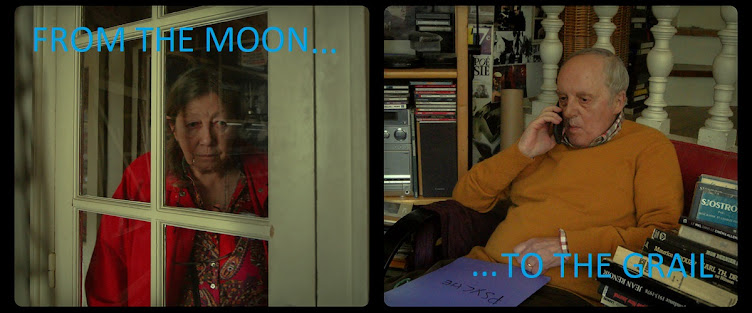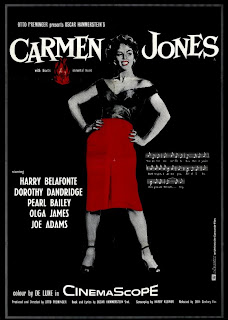Running Time: 80 minutes
Directed By: Allan Dwan
Written By: Karen DeWolf
Main Cast: John Payne, Lizabeth Scott, Dan Duryea, Dolores Moran, Emile Meyer
Click here to view the trailer
BETTER THAN 'HIGH NOON'
Yes, I said it. "Silver Lode" is a better film than "High Noon", a comparison I make because the films are similarly structured. Anyway, I'll get to the reasoning in a bit. I needed a short movie last night to pass the time while the wife watched "Survivor", so I grabbed "Silver Lode", which has been sitting here via Netflix, waiting to be watched.
Most plot synopsis' of this film will be quick to point out that this western is a thinly veiled hint at McCarthyism, which it is. However, forget about all that, because it's also a hell of a western, loaded with action (well as much as can be loaded into eighty minutes) and there's no need to muck things up, dragging politics and political themes into the mix. John Payne is Dan Ballard, a highly respected citizen of Silver Lode (but a citizen who has only lived there for about two years) who, when the film begins, is about to get married. As the wedding bells ring and the guests gather, however, U.S. Marshall Fred McCarty and his deputies ride into town, showing a warrant for Dan Ballard's arrest and demanding to know where he is. Eventually they find him and since their paperwork is fully in order, the townspeople - most notably Sheriff Wooley and Judge Cranston - have no choice but to turn him over to the Marshall. The charges that McCarty brings to Ballard are of murder and for stealing $20,000. As the talking continues we learn that the murder Ballard is being accused of, is that of McCarty's brother and the $20,000 was also his, according to McCarty. Ballard admits to killing McCarty's brother, but only in self defense and being the highly respectable citizen he is, nearly the whole town is on his side. Ballard requests two hours to get things in order before McCarty takes him to the nearby town of Discovery to be jailed. During this two hours, Dan hopes to prove that not only are McCarty's papers forged, but that McCarty himself isn't even a real U.S. Marshall. As the two hours ticks by, the townspeople slowly start to turn on Dan.
SPOILER ALERT!
Before I get into defending my "better than High Noon" remark, let me first tell you why this film won't be getting a '10'...or even a '9' or an '8' for that matter. The sole reason this film won't get a rating higher than the one I intend to give it is because of the ending. I absolutely HATED the ending. Because this film wasn't a high profile choice, meaning it wasn't a movie that I'd ever heard of before, Dwan wasn't a director that I'd heard of before and Payne wasn't even an actor that I'd heard of before, I thought the possibility existed for their to be an unhappy ending. Sure it was an RKO release, which means it was still a product of the Hollywood machine, but I thought maybe...just maybe I could get an unhappy ending, which I would have loved. I would've liked the ending to go one of two ways:
1) The townspeople continue to turn on Dan Ballard through till the end of the picture, where they finally gun him down and kill him, just moments before the telegram arrives that would've proved Dan's innocence and proved McCarty to be a liar, saying he WAS NOT a U.S. Marshall. This is the ending I wanted.
However, I would've also settled for....
2) The ending goes exactly as it did, with Dolly and Rose running back to the church with the fake telegram and telling everyone that McCarty wasn't a real U.S. Marshall and Ballard killing McCarty. We think everything is well, the townspeople re-embrace Dan and we cut to the telegraph office where the real telegram comes in, reading that indeed McCarty is a real U.S. Marshall and to bring in Dan Ballard dead or alive! Sure, it wouldn't have jived with Johnson's earlier claim that McCarty was a poser, but you could've easily plucked the scene where Johnson rats on McCarty and left the whole thing up in the air right down to the very end.
Keep in mind folks that the only reason I try to play screenwriter and rewrite certain endings, is usually because I like the film so much and just really want to see it go a certain way. Anyway, yeah this was a pretty top notch western and I'd even go so far as to say (unless I'm forgetting something) that this is the best western I've watched for THE BOOK thus far, aside from the Sergio Leone offerings. I thought the whole cast was great and how in the world had I never heard of John Payne before "Silver Lode"? Was he just not that popular? I thought he was great! He had a soft spoken quality about him, where he kept his voice calm and low, but you still knew he meant business and was ready to draw guns if things got serious. He was like a much calmer John Wayne, with a dash of Jimmy Stewart mixed in. I thought he was top notch. Dan Duryea was also really good as the bad guy and Dolores Moran wasn't hard to look at. I liked how the film kind of built like "12 Angry Men", in that the townspeople's minds slowly began to change, one by one, over the course of the whole movie, until one man stood alone against the whole town at the end. Oh and speaking of the end, the film gets extra points for falling under my "any ending that takes place in the top of a belltower, clocktower or lighthouse is automatically awesome" rule.
Yes, this film is much better than "High Noon". Four strangers swagger into town (well, their horses do the swaggering I guess), with the sole purpose of killing one man and in the battle of Silver Lode vs. High Noon, Silver Lode gets my vote by a mile. This is a top notch western and if you're looking for a good film that represents the genre suitably, then this is as good a choice as any. It's short and to the point and for eighty minutes long, it sure does pack a hell of a punch.
RATING: 7.5/10 Had they gone with my ending #1, we'd be seriously talking about a '10/10', but it is what it is. If ever there were a season to be called the "Western Season" this is it. Coming up later in the season: "Shane", "The Searchers", "Ride Lonesome" and all of the Anthony Mann westerns. Stay tuned.
MOVIES WATCHED: 622
MOVIES LEFT TO WATCH: 379
February 28, 2012 4:28pm




















.jpg)











.jpg)





_-06.jpg)







